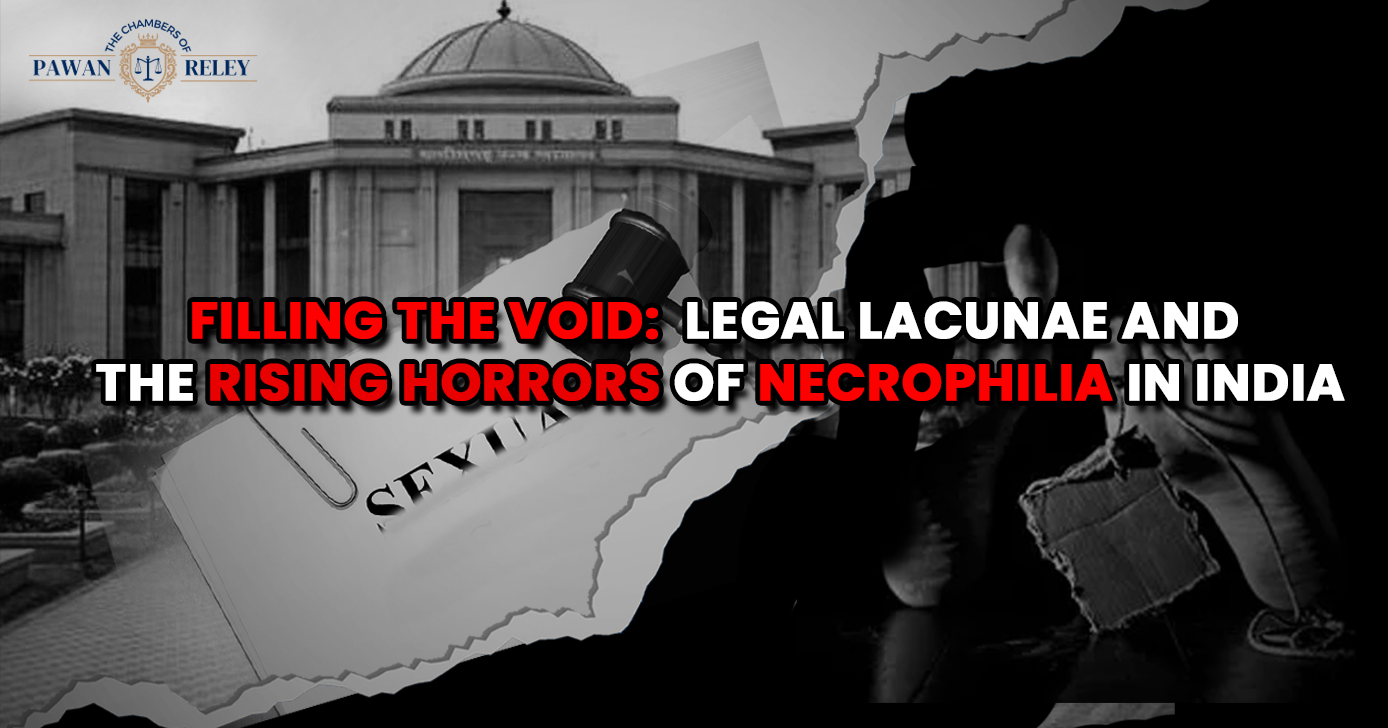Filling the Void: Legal Lacunae & the Rising Horrors of Necrophilia in India
I. Introduction
The current era has posed a significant threat to the inherent dignity of women, with heinous rape cases escalating at an alarming rate. It is even more heart-wrenching that women are not safe even after death. Their corpses are being sexually exploited by lustful demons who have either abandoned all sense of humanity or suffer from severe psychological disorders. This horrendous act is known as Necrophilia.
In 1850, Belgian psychologist Joseph Guislain introduced the term “Necrophilia,” derived from the Greek words Nekros (corpse) and Philia (love). It denotes a morbid sexual attraction to or intercourse with human corpses.[1]
“Humans Themselves Are The Biggest Threat To Humanity.”
II. Contemporary Judicial Pronouncements
The recent judicial pronouncement by the Hon’ble Chhattisgarh High Court in the case of Neelkanth v. State of Chhattisgarh, 2024 SCC Online Chhattisgarh 13078, has sparked a nationwide debate on the criminalization of this abhorrent act and highlighted the urgent need to address the gaps and loopholes in the current legal framework to effectively tackle this issue.
In Paragraph 31 of its judgment, the Hon’ble High Court recognized the right of the deceased but acknowledged its inability to prosecute the offender for the act of raping a corpse due to the limitations of the existing legal framework. While acquitting the accused for the charges of rape it stated –
“31… There is no doubt that the offence committed by the accused-Neelkanth @ Neelu Nagesh i.e. raping a dead body is one of the most horrendous crimes one can think of but the fact of the matter is that as on date, the said accused cannot be convicted for the offence punishable under Sections 363, 376 (3) of the IPC, Section 6 of the POCSO Act, 2012 and Section 3(2)(v) of the Act of 1989 as the offence of rape was committed with a dead body and for convicting an offence under the aforementioned Sections, the victim should be alive…
There can be no disagreement on the issue that dignity and fair treatment is not only available to a living man but also to his dead body and every dead body is entitled for a respectful treatment but the law as on date has to be applied to the facts of the case...”[2]
The approach adopted by the Bench aligns with two established legal doctrines. The first is the principle of nulla poena sine lege, which ensures that no individual is punished for an act unless it is explicitly prohibited by law. The second is the rule of lenity, a principle of strict statutory interpretation that resolves ambiguities in statutory provisions in favor of the defendant and against the government. Applying the rule of lenity, the court held that the accused could not be found guilty of necrophilia, thereby shifting the responsibility onto the State to enact specific provisions addressing this crime. The Bench identified lacunae in the legal framework and observed that under the Indian Penal Code, a human corpse does not fall within the definition clause, precluding the act from being prosecuted under Section 375, which pertains to rape. Acknowledging the inadequacy of existing provisions to deter such crimes, the Bench emphasized the urgent need for legislative reforms to uphold the sanctity and dignity of the deceased.[3]
The most significant judgment highlighting the dire need for the criminalization of this horrendous act of Necrophilia was pronounced by the Hon’ble Karnataka High Court in the case of Rangaraju v. State of Karnataka, 2023 SCC OnLine Kar 23. The bench exposed the legal lacunae in the current Indian legal frame work making out the following recommendations –
(i) "It is high time for the Central Government to amend the provisions of Section 377 of IPC and should include dead body of men, woman or animal as contemplated under the said provision; Or The Central Government shall amend the new provision in the IPC with regard to sadism or necrophilia against the person whoever voluntarily has carnal intercourse against the natural including the dead body of the woman, punishable with imprisonment of life or with imprisonment of either description for a term which may extend to ten years and also shall be liable for fine.
(ii) It is high time for the State Government to ensure installation of CCTV cameras in the mortuaries of all the government and private hospitals in order to prevent the offence against the dead body of the woman within 6 (six) months from the date of receipt of certified copy of this order.”[4]
Despite the aforementioned recommendations by the Hon’ble Karnataka High Court, they have thus far remained merely documented on paper, with no substantial action taken by the legislature to implement them, even after the enactment of new criminal laws.
Article 21 of the Indian Constitution which guarantees the Right to Life, embraces many aspects of a person’s life including Fundamental Right to Dignity.[5] The Hon’ble Supreme Court and High Courts, through various landmark judicial pronouncements have extended the right under Article 21 to dead persons.
In the case of Parmanand Katara (Pt.) v. Union of India, (1995) 3 SCC 248, the Supreme Court highlighted the importance of conferring dignity to dead persons.[6] Again, it was reiterated by Apex Court in the case of Ashray Adhikar Abhiyan v. Union of India, (2002) 2 SCC 27, that dignity of the dead must be maintained and respected.
Moreover, it extended the right to the homeless deceased person to have a decent cremation according to the religious customs to which one belongs to, it also established a corresponding duty on the State to ensure that decent cremation is served to the person.[7] In P. Rathinam v. Union of India, 1994 (SCC (3) 394), the ambit of article 21 was widened to include the dignity of a person. It emphasized that the right to life means a meaningful life and not merely animal existence. Further, this fundamental right to dignity was also expanded to a dead person.[8]
III. Legal Lacunae in the Current Framework
There is no explicit provision in the current laws that directly address this horrendous act of necrophilia. The new criminal laws that came into effect on July 1, 2024, represent a missed opportunity to address the crime of necrophilia. Despite repeated judicial calls for reform to tackle such heinous acts, the issue remains unaddressed in the newly enacted legislation. The horrors of Necrophilia still remain neglected in the present Indian legal framework.
The Section 297 IPC now Section 301 BNS comes closest to protect the dignity of the deceased individuals. Any individual who knowingly trespasses into a place of worship, a funeral site, or a location designated for the remains of the deceased, with the intent to insult or wound religious sentiments, or who treats a corpse with indignity or disrupts funeral proceedings, shall be punished with imprisonment for up to one year, a fine, or both. This provision primarily aims to protect burial grounds and maintain the sanctity of the deceased’s resting place, rather than specifically addressing necrophilia or sadistic acts committed against a corpse.[9] A significant drawback is that individuals present in an official capacity, such as morgue attendants or cremators, would not be held liable under this section, even if they engage in acts like penetrating a corpse, as long as they do not commit the act of ‘trespass.’ Another major criticism of using this provision to punish necrophiles is the minimal punishment it prescribes, with a maximum imprisonment of only one year.
The Indian Penal Code (Amendment) Bill 2023 – Bill No. 52 of 2023 which was introduced in the Rajya Sabha on 8th December 2023 before the enactment of BNS, recommended the inclusion of Section 377A in IPC which criminalized the act of Necrophilia. It stated – “377-A. whoever voluntarily harms the dignity or right of a dead person, shall be punished with imprisonment of either description for a term which may extend to ten years and shall also be liable to fine.”[10] However, the introduction of bill was a futile attempt and no changes were made. The even more alarming call by the government was the complete removal of Section 377 from the BNS. While not entirely pertinent to cases of necrophilia, prior to the enactment of the new criminal law, this provision was often associated with cases of unnatural offences involving deceased bodies, due to the inclusion of the term ‘unnatural offence’ within the section.[11] In the landmark judgment of Navtej Singh Johar v. Union of India, (2018) 10 SCC 1, the honorable apex court struck down the criminalization of consensual unnatural sexual intercourse between the two individuals but the complete removal of the provision will result in a travesty of justice to those individuals who were sexually exploited unnaturally without their consent.[12]
Moreover, the term women is defined under Section 10 of IPC & now Section 2(35) of BNS as – ““woman” means a female human being of any age.”[13] The definition itself makes it clear that it only includes living women, which expels out the act of necrophilia from the ambit of rape defined under Section 63 of the BNS making it inapplicable to women dead bodies.[14]
IV. International Stance
In India, the recent rise in necrophilia-related incidents has been exacerbated by the lack of specific legislation to address and penalize such acts effectively. The international stance on this issue is not significantly different from India’s position. This abhorrent act has been largely overlooked for an extended period. However, some states have explicitly criminalized it, while others have attempted to address it indirectly through broader legal provisions. In United Kingdom, Section 70 of the Sexual Offences Act, 2003 of the UK makes it an offence for a person who intentionally sexually penetrates, knowingly or recklessly, any part of his body into any part of a dead person. It reads as follows:
“Sec. 70 Sexual penetration of a corpse
(1) A person commits an offence if:
(a) He intentionally performs an act of penetration with a part of his body or anything else, (b) what is penetrated is a part of the body of a dead person, (c) he knows that, or is reckless as to whether, that is what is penetrated, and (d) the penetration is sexual.(2) A person guilty of an offence under this section is liable (a) on summary conviction, to imprisonment for a term not exceeding 6 months or a fine not exceeding the statutory maximum or both; (b) on conviction on indictment, to imprisonment for a term not exceeding 2 years”
[15]
In Canada, Section 182 of the Criminal Code of Canada, 1985, explicitly criminalizes necrophilia.[16] Similarly, in New Zealand, Section 150 of the Crimes Act, 1961, prescribes a penalty of up to two years‘ imprisonment for any act committed upon a corpse, whether buried or unburied, that desecrates its dignity.[17] In South Africa, Section 14 of the Criminal Law (Sexual Offences and Related Matters) Amendment Act, 2007, categorically prohibits necrophilia.[18] In Australia, the unlawful act of necrophilia is penalized under Section 236 of the Criminal Code Act, 1995, which classifies engaging in sexual intercourse with a deceased person as a grave criminal offense punishable by up to ten years’ imprisonment.[19] Germany similarly criminalizes necrophilia under Section 168 of the German Criminal Code, which addresses the disturbance of the peace of the dead. Acts of necrophilia are considered illegal and are punishable by a maximum of three years’ imprisonment.[20] These legislations uphold the inherent dignity of individuals even after death, thereby reinforcing the principles of human rights.
V. Conclusion
The recent trends have revealed a disturbing rise in cases of necrophilia, including the infamous Nithari Killings and the Karim Ganj Hospital Case. The absence of specific legal provisions addressing this heinous act has contributed to its alarming escalation. It is imperative for Indian lawmakers to draw lessons from recent judicial pronouncements and statutory frameworks in the international sphere that criminalize necrophilia. The advisory issued by the National Human Rights Commission on 14.05.2021, titled “Upholding the Dignity and Protecting the Rights of the Dead,” must also be considered during the legislative process.[21] Judicial recommendations and global criminal statutes should serve as the cornerstone for enacting a comprehensive legal framework to address this egregious and inhumane conduct. Filling this legislative void is essential to uphold the inherent dignity of human beings and to prevent such grave violations, ensuring that the integrity of the Indian legal system remains uncompromised.



